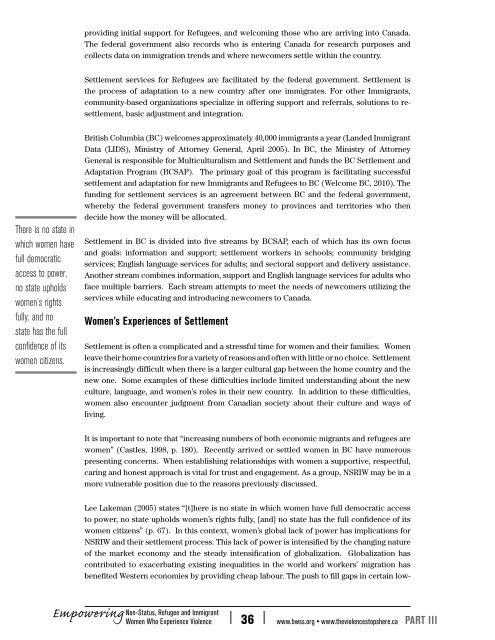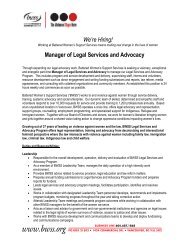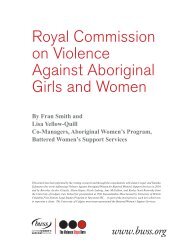migration-immigration-settlement
migration-immigration-settlement
migration-immigration-settlement
You also want an ePaper? Increase the reach of your titles
YUMPU automatically turns print PDFs into web optimized ePapers that Google loves.
providing initial support for Refugees, and welcoming those who are arriving into Canada.<br />
The federal government also records who is entering Canada for research purposes and<br />
collects data on im<strong>migration</strong> trends and where newcomers settle within the country.<br />
Settlement services for Refugees are facilitated by the federal government. Settlement is<br />
the process of adaptation to a new country after one immigrates. For other Immigrants,<br />
community-based organizations specialize in offering support and referrals, solutions to re<strong>settlement</strong>,<br />
basic adjustment and integration.<br />
There is no state in<br />
which women have<br />
full democratic<br />
access to power,<br />
no state upholds<br />
women’s rights<br />
fully, and no<br />
state has the full<br />
confidence of its<br />
women citizens.<br />
British Columbia (BC) welcomes approximately 40,000 immigrants a year (Landed Immigrant<br />
Data (LIDS), Ministry of Attorney General, April 2005). In BC, the Ministry of Attorney<br />
General is responsible for Multiculturalism and Settlement and funds the BC Settlement and<br />
Adaptation Program (BCSAP). The primary goal of this program is facilitating successful<br />
<strong>settlement</strong> and adaptation for new Immigrants and Refugees to BC (Welcome BC, 2010). The<br />
funding for <strong>settlement</strong> services is an agreement between BC and the federal government,<br />
whereby the federal government transfers money to provinces and territories who then<br />
decide how the money will be allocated.<br />
Settlement in BC is divided into five streams by BCSAP, each of which has its own focus<br />
and goals: information and support; <strong>settlement</strong> workers in schools; community bridging<br />
services; English language services for adults; and sectoral support and delivery assistance.<br />
Another stream combines information, support and English language services for adults who<br />
face multiple barriers. Each stream attempts to meet the needs of newcomers utilizing the<br />
services while educating and introducing newcomers to Canada.<br />
Women’s Experiences of Settlement<br />
Settlement is often a complicated and a stressful time for women and their families. Women<br />
leave their home countries for a variety of reasons and often with little or no choice. Settlement<br />
is increasingly difficult when there is a larger cultural gap between the home country and the<br />
new one. Some examples of these difficulties include limited understanding about the new<br />
culture, language, and women’s roles in their new country. In addition to these difficulties,<br />
women also encounter judgment from Canadian society about their culture and ways of<br />
living.<br />
It is important to note that “increasing numbers of both economic migrants and refugees are<br />
women” (Castles, 1998, p. 180). Recently arrived or settled women in BC have numerous<br />
presenting concerns. When establishing relationships with women a supportive, respectful,<br />
caring and honest approach is vital for trust and engagement. As a group, NSRIW may be in a<br />
more vulnerable position due to the reasons previously discussed.<br />
Lee Lakeman (2005) states “[t]here is no state in which women have full democratic access<br />
to power, no state upholds women’s rights fully, [and] no state has the full confidence of its<br />
women citizens” (p. 67). In this context, women’s global lack of power has implications for<br />
NSRIW and their <strong>settlement</strong> process. This lack of power is intensified by the changing nature<br />
of the market economy and the steady intensification of globalization. Globalization has<br />
contributed to exacerbating existing inequalities in the world and workers’ <strong>migration</strong> has<br />
benefited Western economies by providing cheap labour. The push to fill gaps in certain low-<br />
Empowering Non-Status, Refugee and Immigrant<br />
Women Who Experience Violence 36 www.bwss.org • www.theviolencestopshere.ca PART III




